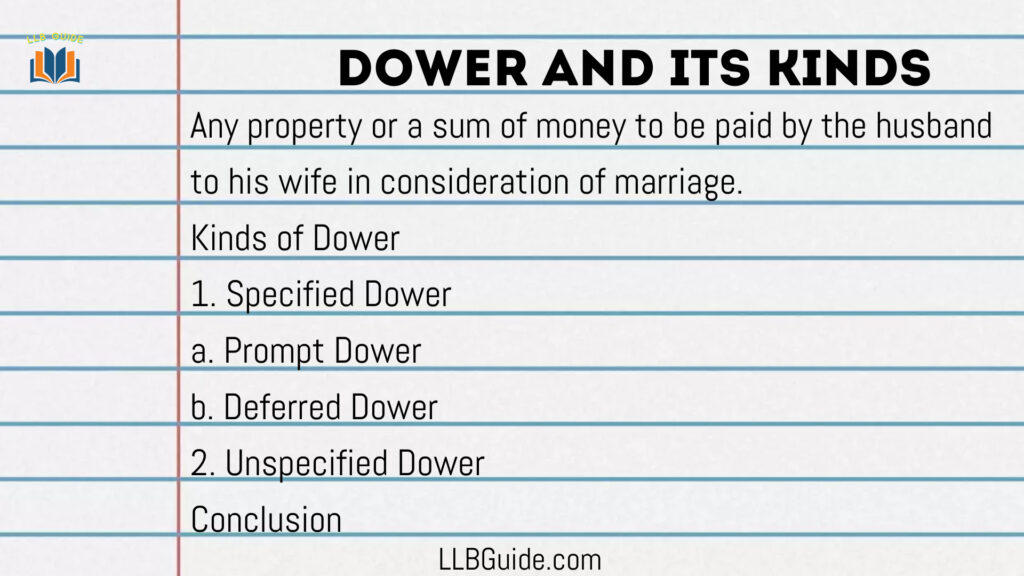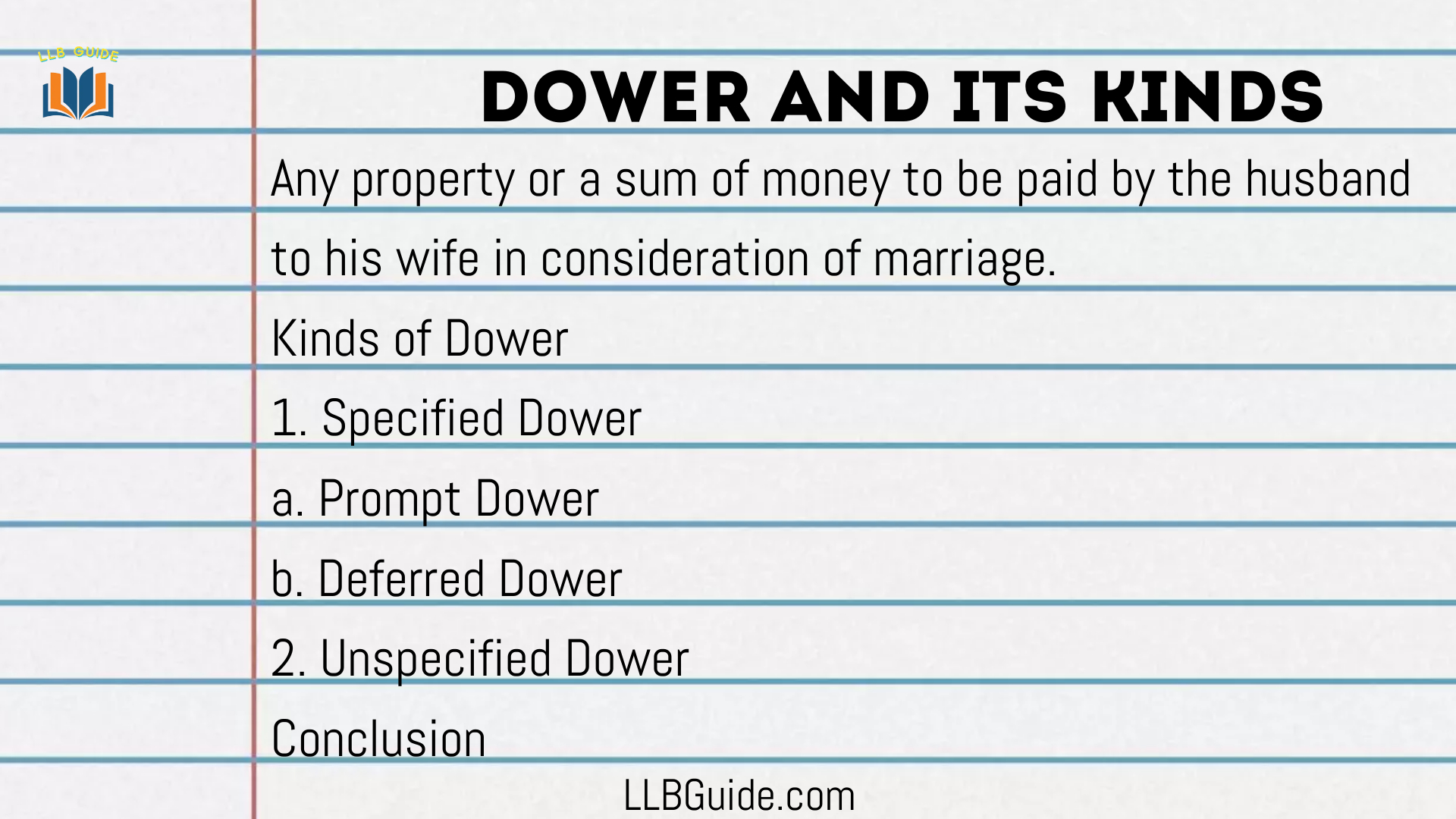Dower definition includes ‘an obligatory amount to be paid by the husband to his wife’. It is one of the elements for the the validity of marriage. In ancient times, the condition of the wife was miserable. There was no concept of dower and no rights were given to the wife during or after dissolution of marriage. Islam introduced a new form of marriage and the concept of a dower where the husband had to pay an amount to his wife as a consideration of marriage as a remark of respect or a sample of love.

Table of Contents
What is Dower?
The detailed concept of a dower is explained below.
Dower Meaning
Dower literally means money or property given by the husband to his wife, it is derived from the Arabic word ‘Mehr’. It is an obligation and it creates debt. It is a mandatory gift or token of love. It can be paid at the time of marriage, during marriage, or at the time of dissolution of marriage.
Dower Definition
Some Dower Definition s are:
Dower is a kind of consideration that belongs to the wife.
A dower is a sum of money or property that a wife is entitled to receive from her husband in consideration of marriage.
According to Muhammadan Law, Any property or a sum of money to be paid by the husband to his wife in consideration of marriage is called Dower.
Amount of Dower
The maximum amount of dower has not been described, but under Different Schools of thought, the minimum amount of dower is mentioned which is:
- Under the Hanafi school of thought is 10 Dirhams (which was 4.25 grams of Gold).
- Under Maliki’s school of thought is 3 Dirhams.
- Under the Shafi school of thought, Not fixed.
Subject of Dower
Things of Dower must not be uncertain and must have some existence and have some market value. The subject matter of Dower may include:
- An amount of money.
- Any property (movable or immovable).
- Anything having some market value.
Object of Dower
The focal object of the dower is that it is paid as a remark of respect and a pure symbol of love and affection. It also provides the protection and preservation of the rights of women against their husband’s abuse.
Dower in Islam
Hazrat ALi (R.A) Said,
“There can be no marriage without dower”.
The dower has a significant place in Islam, even Islam has introduced the dower. Dower in Islam is a mandatory (wajib) obligation that must be paid at the time of marriage, during marriage, or at the dissolution of marriage e.g. death or divorce. Dower is different from dowry, as dowry is not mandatory in Islam.
Difference between Dower and Dowry
Dower definition is money or property given by the husband to his wife as consideration of marriage.
Dowry means money or property brought by a woman to her husband at marriage.
A brief difference between dower and dowry:
- The dower is provided by the husband to his wife but the dowry is given from the wife’s side to her husband.
- Dower is mandatory in Islam but dowry is considered a social evil.
- Dower is imposed by Law but dowry is not.
- Dower is followed by Muslims but dowry is followed by Hindus.
- Marriage is not complete without dower but without dowry it is complete.
Kinds of Dower
Following are the kinds of dowers.
Specified Dower
Specified Dower is also known as Mehr-ul- Mussama. When the subject matter of the dower (e.g. an amount or any property) has been specified at the time of marriage (Nikkah), it is specified dower. On the basis of the time of payment of specified dower, it has further following two types.
- Prompt Dower: It is paid immediately at the time of marriage or on demand by the wife.
- Deferred Dower: It is paid later on, on the happening of an event e.g. death of husband or dissolution of marriage.
Unspecified Dower
Unspecified Dower is also known as Mehr-ul-Mithl. It is such a dower that is not fixed or specified at the time of marriage (Nikkah). The wife is entitled to claim the dower even if the dower is unspecified. The Court will fix the dower by observing the following aspects:
- The economic condition of a husband
- Dower given to wife’s relatives
- Status of wife’s father
- Wife’s qualifications
- Any other aspect
When Dower Can Be Claimed?
Dower can be claimed under the following circumstances:
- On-demand by wife,
- On the death of her husband,
- On dissolution of marriage,
- Even in the case of Apostasy, she can claim her Dower.
Remission of Dower
In Surah Nisa In The Holy Quran, ALLAH Almighty says:
‘And give the women their Mehr in good cheer. Then, if they give up some of it, out of their own sweet will, you may have it, to your advantage and pleasure’.
Dower can be remitted. As The Holy Quran mentioned it is the discretion of the wife, whether she remits the dower or part of it, or not, it’s up to her.
Remedies against Unpaid Dower
Dower is the right of the wife and a mandatory obligation of the husband, in case of refusal of dower she has the following remedies:
- Refuse to live with her husband
- File a suit to recover from her husband’s property
- Retain her husband’s property
Conclusion
Dower definition and its kinds include ‘an obligatory amount to be paid by the husband to his wife’. It is one of the elements for the the validity of marriage. It can be specified at the time of marriage (Nikkah) and payable immediately, on remand, or in case of divorce or death of husband. If the dower it is not specified Court will after observing some aspects determine the amount of dower that will be paid to the wife.
FAQs
What is the difference between dower and dowry?
Dower means money or property given by the husband to his wife as consideration of marriage. Whereas
Dowry means money or property brought by a woman to her husband at marriage.
What are the different types of Mehar?
Prompt Dower and Deferred Dower.
What is dower in the Quran?
Dower in Islam is a mandatory (wajib) obligation that must be paid at the time of marriage, during marriage, or at the dissolution of marriage.
Is dower a gift?
Yes, a dower is a gift given by the husband to his wife.

